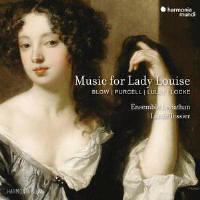Texte paru dans: / Appeared in: |
|
|
Outil de traduction |
|
|
Louise kept her own musical household, and indulged Charles’s love of things French by arranging concerts given by singers and musicians from her native country. This recording reflects her taste in both French and English music; that many of the numbers were composed after she had left the English court will not detract from your enjoyment. The programme, devised by Lucile Tessier, is divided into four sections, from ‘Rustick Music’ to ‘Mourning Songs’. Ensemble Leviathan here consists of four singers and pairs of recorders, oboes and violins, plus continuo, Tessier herself playing recorder, oboe and bassoon. This is their first disc. Some 15 of the 24 tracks are short, lasting two minutes or less. The four excerpts from Venus and Adonis are an alltoo-brief reminder of the gifts of John Blow, a composer still overshadowed by Purcell; the opening section of his ode on Purcell’s death, introduced by melancholy recorders, is a more extensive tribute. Purcell himself gets a look-in, too. ‘Hence with your trifling deity’ from Timon of Athens has a nice switch to the minor at ‘Love makes you languid and look pale’. The bass David Witczak catches the change of mood here, and he is suitably solemn in ‘Prepare, the rites begin’ from Theodosius, albeit without quite the resonance that David Thomas brings to the Christopher Hogwood recording (L’Oiseau-Lyre/Decca, 3/82). ‘See, even Night herself is here’ from The Fairy Queen is beautifully sung in hushed tones by Eugénie Lefebvre, shadowed by the recorders. These latter two are in the section ‘Soft Music’. Of the less familiar pieces, the unaccompanied ‘Forth from the dark and dismal cell’ outstays its welcome. ‘De foolish English nation’ and ‘A new song sung by a fop …’ are mildly amusing examples of English composers poking fun at the French. ‘Oh! Take him gently’ (from the third section, ‘Mad Songs’) was written by John Eccles for the famous singing actress Anne Bracegirdle. The recording made nearly 25 years ago by Evelyn Tubb and Anthony Rooley benefits from the inclusion of spoken dialogue, but Lefebvre’s account is gripping enough. The two longest pieces, at around seven minutes each, are by Lully. The sleep scene from Atys was apparently a favourite of Charles II. The three men, David Witczak supporting the haute-contre Clément Debieuvre and tenor Davy Cornillot, sing so ravishingly that you will immediately want to play the track again. ‘Que ces gazons sont verts’ from Roland, another mad song, is misleadingly presented as one continuous piece, without the substantial divertissement in the middle. The tempo speeds up at ‘Je suis trahi!’, with some extremely nimble bassoon-playing from Lucile Tessier. Witczak moves from tranquillity to bafflement and despair with a sure touch. A fine recording, then, and there’s a fine portrait of Louise on the cover. But it’s not the one by Pierre Magnard that hangs in the National Portrait Gallery, as the booklet states: it’s actually an earlier painting by Peter Lely, which may be seen at the Getty Museum in California.
|
|
_small.jpg)



